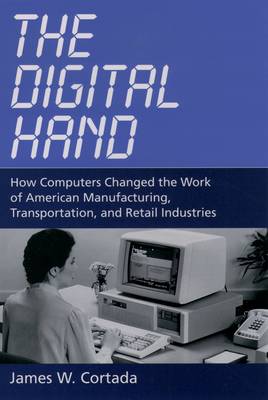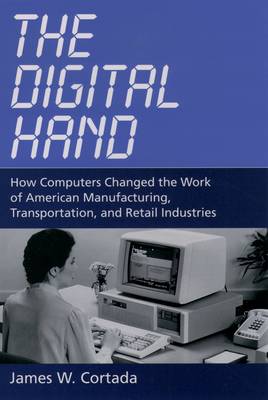
- Afhalen na 1 uur in een winkel met voorraad
- Gratis thuislevering in België vanaf € 30
- Ruim aanbod met 7 miljoen producten
- Afhalen na 1 uur in een winkel met voorraad
- Gratis thuislevering in België vanaf € 30
- Ruim aanbod met 7 miljoen producten
Zoeken
The Digital Hand
How Computers Changed the Work of American Manufacturing, Transportation, and Retail Industries
James W Cortada
Hardcover | Engels
€ 166,45
+ 332 punten
Uitvoering
Omschrijving
In The Digital Hand, James W. Cortada combines detailed analysis with narrative history to provide a broad overview of computing's role in sixteen industries, accounting for nearly half of the U.S. economy. Beginning in 1950, when commercial applications of digital technology began to appear, Cortada examines the ways different industries adopted new technologies, as well as the ways their innovative applications influenced other industries and the U.S economy. In addition, to this account of computers' impact on industry, Cortada also demonstrates how industries themselves influenced the nature of digital technology. Managers, economists, and anyone interested in the history of modern business will appreciate this historical analysis of digital technology's many roles and its future possibilities in a wide array of industries. A detailed picture of what the infrastructure of the Information Age really looks like and how we got there, The Digital Hand is a sweeping survey of how computers transformed the American economy.
Specificaties
Betrokkenen
- Auteur(s):
- Uitgeverij:
Inhoud
- Aantal bladzijden:
- 494
- Taal:
- Engels
Eigenschappen
- Productcode (EAN):
- 9780195165883
- Verschijningsdatum:
- 4/12/2003
- Uitvoering:
- Hardcover
- Formaat:
- Genaaid
- Afmetingen:
- 157 mm x 245 mm
- Gewicht:
- 866 g

Alleen bij Standaard Boekhandel
+ 332 punten op je klantenkaart van Standaard Boekhandel
Beoordelingen
We publiceren alleen reviews die voldoen aan de voorwaarden voor reviews. Bekijk onze voorwaarden voor reviews.











